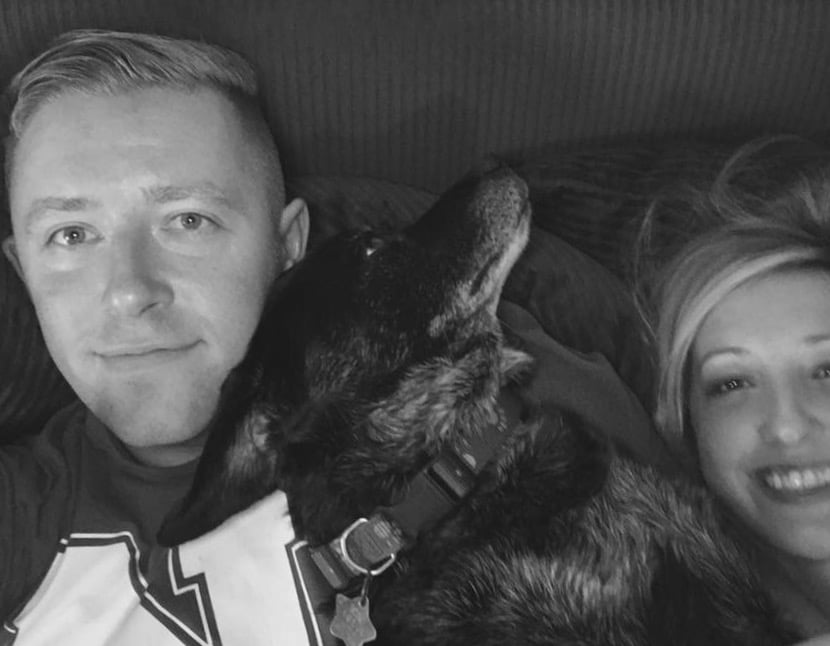A few months ago, something I had been dreading for years happened. Our 14 year old dog, Pierre, died. Despite his age, it was something that was relatively unexpected. Over the course of a few days his health quickly deteriorated and my wife and I sat by his side in the emergency vet and painfully watched him go into cardiac arrest and die after a procedure that we hoped might buy him a little bit of extra time with us. Although it was something we thought we had been mentally and emotionally preparing for over the years, it hit us much harder than ever expected.
I hand-picked Pierre from the litter 6 weeks after he was born and remember the first clumsy little steps he took in the house I lived in at the time like it was yesterday. Pierre was a goofball, a care-free kind of spirit, a friend, and a companion that would be by my side through so many ups and downs and major life changes throughout almost all of my 20s and into my late 30s. Through it all (cross country moves, relationship changes, loss, career-related challenges, and all of the good and bad), Pierre was the one stable long-term fixture – relentlessly waiting by the door to greet me with a wagging tail when I came home regardless of the kind of day I was having.
The bonds we develop with pets are unique. Similar to human companionship we share love and affection with our pets. They make us laugh, smile, and cry. Unlike human companionship, however, the relationship we have with our pets is relatively simple. It doesn’t come along with the kind of baggage that comes along with the complexity of even really great human relationships. Because of this, when we lose this, we lose a truly pure connection. The loss is real. The pain is valid. Like the stages of grief that occur when a friend or family member dies, it’s normal to expect a range of emotions and a difficult journey through the stages of grief and healing.
In writing this article I don’t aim to make any comparisons as it relates to the value of life or loss of a human – but simply to validate the pain associated with the loss of a pet. It’s not uncommon for people to question whether or not their great sense of loss is legitimate when they look around and see others that have lost friends, parents, children, partners, or other loved ones. I’m here to tell you that although it might be different and that no comparison is appropriate, that the pain is real, that it’s okay, and that it’s valid.
If you’re not already familiar with the traditional grieving model (The 5 stages of grief), I’ll outline it here and briefly explain what kinds of things can be expected throughout the process of grieving the loss of a pet. In understanding the process and stages of grief, it’s important to note that the process of grief is different for everyone. The stages of grief provide a framework for understanding the process on a basic level, but it’s not necessarily the case that every person will experience every stage, the same level of intensity for any stage, or progress through the process in a sequential order.
1 – Denial – This is usually the first stage of any loss. Although we might logically know and understand what happened, it’s not uncommon to have a hard time believing it. It’s accompanied by thoughts like, “this can’t be real” or “how could this have happened?”. We aren’t yet ready to accept reality.
2 – Anger – The stage of anger usually presents itself when we start asking questions about how or why the death occurred and can be directed towards oneself or towards other people. For example, we might get angry with a veterinarian for not being able to provide effective treatment or for suggesting euthanasia. We might get angry with ourselves or with other family members for not seeking care sooner. This anger is often rooted in irrational beliefs and is simply a normal response to losing something you felt so strongly for.
3 – Bargaining – Not everyone experiences bargaining, but this stage usually includes a lot of “what if” or “if only” statements. For example, “If only I had noticed something wrong sooner” or “what if we had seen a different doctor?”. In some cases, people will find themselves bargaining on a supernatural level, asking for emotional relief or for things to play out differently. They’re essentially desperate attempts at gaining some control in a situation we have found to have no control over.
4 – Depression – This is a commonly accepted and understood stage of grief that refers to the sadness and despair someone might feel in the aftermath of the loss of a pet. It can lead to isolation, withdrawal, feelings of hopelessness or futility, or a sense of numbness. It can be difficult to accept that something we loved and lost will never return. This can make it hard to function normally at work, school, or home.
5 – Acceptance – This is the stage of grief that usually comes last in the process. It usually takes place long after reality has set in, the grief has been processed, and a certain amount of healing has already taken place. Reaching “acceptance” does not mean that one is “over the loss” or without any remaining sadness, but just that some sense of it has been made and accepted. We forever hold onto the memories of our beloved furry friends and may make room for more in our households, but can never replace the unique role that any lost pet played in our lives.
Coping with the loss
Although it might be difficult to feel much better for a while, there are things that can be done to cope with the loss of a pet in a healthy way. Here are a few of those things:
- Talk about it with someone who understands on some basic level. Immediate family members who shared the same bond and friends who have lost pets will be able to relate and to empathize. This is important.
- Identify feelings of guilt and reframe thinking. It’s normal to feel some guilt after the loss of a pet. We often wonder if we could or should have done something differently and take some of the blame for the outcome. This isn’t helpful or healthy.
- Remember that your feelings of sadness (no matter how intense) are an expression of the love you had for your pet.
- Write or talk about the good memories. Look at pictures. Remember that although your pet might be gone from you physically, that you’ll carry the memories you had with them throughout your life.
- Allow yourself to be sad and to not be okay. Allow yourself to express that sadness and to feel the pain. Cry if you feel like crying. Understand that it’s normal.
- Find some way to memorialize your pet. Frame a picture or create an area in your house or yard to dedicate to your pet. Keep a favorite toy or collar to have in that space.
- Take care of yourself. Although appetite and motivation might decrease during initial stages of grief, make sure to get sleep, exercise, and nourishment for your body.
- Be patient with yourself. Although nobody really cares to hear that they’ll feel better soon when they are grieving, it can generally be expected that the intensity of emotions will gradually decrease and that it won’t always feel as bad as it does during the initial stages.
If you’re dealing with any form of grief and are considering seeking counseling to help cope with it, you can send us a message or you can call or text 727-258-5231.


Hello Trisha, my name is Jaime-lee and i have been searching for somebody to talk to about my beloved baby who passed away not long ago. His name is Jet and he is a black Ragdoll kitten just about 2 years of age and he was thee most beloved being i have ever lost, i feel so much emptiness and i want to fill full of love, i want my home o feel full not empty, i have so much to talk about on the matter. I am 16 years old and i need spiritual guidance.. desperately.
Hi, Jaime-lee. Please call our main number at 813-515-9602 or email counseling@floatoncounseling.com. We’d love to see what we can do to help.
I lost my dog 3 days ago and I’m dieing inside. I can’t bare the pain. It’s so devastating. I had Teddy in my life for 15 years. Now he’s gone. The house is empty no joy Noone happy to see me. This little guy was my everything. It hurts so bad. I had to let go 3 other dogs in my life but this one puts the icing on the cake. He was my heart and soul. Why does God put us through this ? I know, everyone says it will take time to feel better but im almost convinced it won’t. Can’t eat or sleep. Don’t want to socialize. How on earth does it get easier ? I’ve never felt this much pain and it won’t go away !
Hey, Jerry. Sorry I didn’t see this comment earlier. Teddy must have been very lucky to have someone who loved him so much. As a dog lover and as someone who has lost a couple really close ones, trust me when I say I feel the pain. I know it’s hard to imagine feeling better. The best thing I think we can do is have someone to talk to that gets it – whether it’s a friend, a family member, a support group, or a therapist. This helps us really process and start to heal. Someone once told me that our grief is only an expression of love and that resonated with me. Feel free to email me joel@floatoncounseling.com if there’s anything I can do or if I can help point you in the right direction for support.